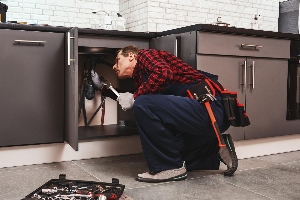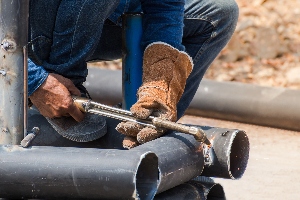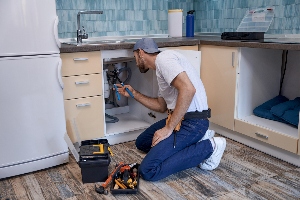Drain cleaning is an essential aspect of maintaining a healthy household environment. Over time, your house's plumbing system can accumulate a variety of substances such as hair, soap scum, grease, and food particles, leading to blockages and slow drainage. These clogs can not only cause inconvenience but also provide a breeding ground for bacteria and emit unpleasant odors. By regularly cleaning your drains, you prevent the buildup that could otherwise compromise the efficient functioning of your plumbing system and impact your home’s sanitary conditions.
Proper drain maintenance can also go a long way in preserving your plumbing and avoiding costly repairs. When debris builds up in pipes, the pressure can cause cracks or bursts, letting wastewater seep into areas it shouldn't and potentially causing damage to your home. Employing simple habits, like pouring hot water down the drains weekly or using a combination of baking soda and vinegar, can help keep your drains clear and free from obstructive residue.
Besides the practical benefits, clean drains are directly linked to the health of your household. Residues in clogged drains can harbor germs and parasites, increasing the risk of infection and disease. Ensuring your drains are clean is a straightforward yet powerful way to contribute to a hygienic living space, preventing the spread of harmful microbes that can impact your health and that of your family.
Importance of Drain Cleaning
Regular drain cleaning is essential to avoid plumbing disruptions and maintain a healthy living environment. Through routine maintenance, you ensure that your plumbing system operates efficiently and securely.
Preventing Blockages and Overflows
- Avoid Blockages: Regular cleaning removes build-up such as hair, grease, and soap scum, which can cause blockages.
- Prevent Overflows: Clearing pipes systematically helps prevent sink and toilet overflows, which can lead to costly water damage and repairs.
Reducing Health Risks
- Eliminate Bacteria: Organic matter decaying in pipes can foster bacteria and mold growth, presenting health risks to you and your family.
- Reduce Foul Odors: Regular drain cleaning also removes the cause of unpleasant smells, improving your home's overall air quality.
Maintaining Plumbing System Health
- Extend Lifespan: Keeping drains free of obstructions can extend the life of your plumbing system.
- Optimize Performance: Clear drains ensure optimal water flow and pressure, preventing undue strain on pipes and fixtures.
Health Implications of Clogged Drains
Clogged drains in your home can lead to serious health concerns, particularly through microbial growth and compromised indoor air quality.
Microbial Growth and Infections
When water stagnates due to a clog, it creates an environment conducive to microbial growth, including bacteria and molds. These microorganisms can lead to infections especially in individuals with weakened immune systems. For instance, bacteria such as Pseudomonas aeruginosa can thrive in moist conditions and are known to cause respiratory infections if inhaled.
Indoor Air Quality Concerns
In addition to fostering bacteria, blocked drains can lead to the development of mold which degrades indoor air quality. This mold can produce allergens and irritants that may trigger asthma attacks or cause other respiratory issues. Standing water in clogged drains can also produce unpleasant odors, contributing to a poor living environment and potentially causing headaches or chronic fatigue.
Methods of Drain Cleaning
When maintaining your home’s plumbing, knowing the appropriate drain cleaning methods can prevent clogs and ensure proper flow. There are a variety of tools and services that can aid in this process.
Chemical Cleaners
Chemical drain cleaners are widely available and can quickly dissolve common blockages like hair, grease, and other organic matter. When using these, carefully follow the manufacturer's instructions to avoid damaging your pipes or harming yourself with toxic fumes.
- Safety Tip: Always use gloves and goggles.
Mechanical Tools
Mechanical tools are a hands-on solution for drain cleaning.
- Plunger: Effective for minor clogs close to the drain opening.
- Drain Snakes: Flexible cables that can reach deep into pipes to dislodge blockages.
- Augers: Similar to snakes, but with a corkscrew end to grab debris.
Using mechanical tools requires some physical effort but is typically safer for your pipes than chemical methods.
Professional Drain Cleaning Services
For severe or persistent blockages, a professional drain cleaning service is recommended. These experts have powerful tools at their disposal, such as:
- Motorized Drain Augers: For tougher clogs.
- Hydro-Jetting: Employs high-pressure water to remove blockages and build-up.
Professional services can also offer preventative maintenance, reducing the likelihood of future clogs.
Safety and Precautionary Measures
When cleaning drains, your health and safety are paramount. Proper use of cleaners and appropriate protective equipment are crucial to prevent injuries or health complications.
Proper Use of Chemical Cleaners
When using chemical cleaners, you must always follow the manufacturer’s instructions to avoid hazardous reactions and health risks. Never mix different chemical cleaners, as this could produce toxic fumes. Ensure adequate ventilation to prevent inhalation of harmful gases. For instance, if you're using a chemical to unclog a drain, ensure windows are open, or use an exhaust fan to keep the air circulating.
Here’s a simple table to check before using chemical cleaners:
Action
Reason
Wear gloves and eye protection
To protect against skin and eye irritation
Read the label thoroughly
To understand application procedures and safety warnings
Use only as directed
To minimize the risk of damage to pipes and negate harmful effects
Protective Equipment for Manual Cleaning
Manual drain cleaning exposes you to biological and chemical hazards. Wearing protective equipment is essential. Durable gloves and eye protection can prevent skin and eye contact with contaminants. Use heavy-duty gloves resistant to tearing and punctures — typically made from neoprene, nitrile, or PVC. Safety goggles, not just eyeglasses, are necessary to protect your eyes from splashes. Additionally, wear a long-sleeved shirt and long pants to protect your skin from direct contact with harmful substances.
Beyond the basics, employing a face mask can protect against inhaling fumes and aerosols. If you're utilizing any powered equipment for drain cleaning, such as a drain snake or a jetter, hearing protection like earplugs or earmuffs is also advised to safeguard against long-term hearing damage.
Environmental Considerations
When considering drain cleaning methods, you should take into account how they affect the surrounding environment, particularly the use of eco-friendly options and the impact of harsh chemicals on water systems.
Eco-Friendly Cleaning Solutions
You can opt for various eco-friendly cleaning solutions that minimize environmental harm. These solutions often contain:
- Baking Soda & Vinegar: A common, non-toxic mixture that effectively clears clogs.
- Enzymatic Cleaners: These utilize natural bacteria or enzymes to break down organic matter in drains without damaging pipes or ecosystems.
It is essential to note that these alternatives not only help in maintaining a clean drain but also ensure long-term sustainability and safety for wildlife and plant life in nearby environments.
Impact of Chemicals on Water Systems
Harsh chemical cleaners can have significant negative impacts on water systems. Key points include:
- Toxicity to Aquatic Life: When chemical cleaners are washed down the drain, they can harm aquatic organisms. These substances can cause oxygen depletion and disrupt food chains.
- Contamination of Water Sources: Chemicals can sometimes seep into groundwater, polluting the sources that supply our drinking water.
By keeping these factors in mind, you contribute to a healthier environment and more sustainable practices in drain maintenance.
Advancements in Drain Cleaning Technology
In this section, you'll learn about the latest innovative mechanical solutions and biological enzyme cleaners that are shaping the future of drain maintenance.
Innovative Mechanical Solutions
Your drain cleaning arsenal is now stronger than ever with cutting-edge mechanical tools designed for precision and efficiency. Among these advancements, robotic drain cleaners stand out by providing an automated approach to clearing clogs without the need for manual intervention. Additionally, improvements in high-pressure water jetters have enabled drain cleaning with increased power and versatility. Advanced water jetters can now adjust pressure to suit different pipe sizes and levels of blockage, optimizing the process while reducing potential damage to pipes.
Biological Enzyme Cleaners
Moving away from harsh chemical cleaners, your focus can shift to biological enzyme cleaners which use natural bacteria to break down organic matter safely and effectively.
- Eco-Friendly: These solutions are friendly to the environment, as they don’t involve toxic chemicals.
- Long-Term Maintenance: Regular use helps maintain clear drains and prevent future blockages by continually digesting waste materials.
With these products, you’re not just clearing clogs; you’re promoting healthier, cleaner pipes with a long-term vision for plumbing maintenance.
Preventative Maintenance and Tips
Effective drain maintenance reduces the risk of clogs and ensures your plumbing remains in good condition. It's essential for both hygiene and the longevity of your pipes.
Regular Cleaning Recommendations
To prevent build-up in your drains, perform regular cleaning. Here's a straightforward schedule to follow:
- Weekly: Run hot water through the drains to clear out newly accumulated debris.
- Monthly: Treat your drains with a mixture of hot water and dish soap to break up grease and fat.
Natural Remedies for Drain Maintenance
Using natural solutions can be an effective and eco-friendly way to maintain your drains.
- Baking Soda and Vinegar:some text
- Pour (\frac{1}{2}) cup of baking soda down the drain.
- Follow with (\frac{1}{2}) cup of vinegar, then plug the drain.
- After leaving it to sit overnight, flush the drain with hot water in the morning.
Performing this natural remedy regularly can help keep your drains clear and odor-free.
Legislation and Industry Standards
In the realm of drain cleaning, you must navigate a landscape defined by stringent health and safety regulations, as well as building code requirements. These frameworks are established to ensure your protection and the safe maintenance of plumbing systems.
Health and Safety Regulations
The Occupational Safety and Health Administration (OSHA) sets forth clear guidelines to protect you at work. Specifically, under OSHA standard 1910.141, your workspace, including where drain cleaning occurs, must be kept in sanitary conditions. Here’s a concise outline of what these regulations entail regarding waste removal:
- Solid and Liquid Wastes: Must be removed to avoid health hazards.
- Frequency: As often as necessary to maintain a sanitary condition.
- Vermin Control: Measures must be in place to control pests.
Furthermore, there's a legal obligation for drain cleaner manufacturers to make products safe for both the users and the environment. Chemical drain cleaners must effectively clean without causing undue risk to plumbing systems or your health.
Building Code Requirements for Plumbing
Building codes dictate standards for plumbing to guarantee safety and functionality. When it comes to drain cleaning, the following are key code requirements you should be aware of:
- Cleanliness: Workrooms should be kept clean, with floors being maintained in a dry condition to the extent feasible.
- Drainage: Proper drainage must be sustained, especially in areas where wet processes are used.
Adhering to these regulations ensures that plumbing systems remain operational and mitigates the risk of health hazards arising from inadequate maintenance practices.
Case Studies
Case studies serve as a critical tool for understanding the efficacy of drain maintenance and the repercussions of neglect. They provide concrete examples that can aid in grasping the importance of this often overlooked aspect of sanitation.
Impact of Regular Drain Maintenance
By prioritizing regular drain maintenance, you help avert the buildup of clog-causing debris and the development of harmful pathogens. This proactive approach often involves the use of chemical drain cleaners. When used correctly, according to manufacturer instructions, these cleaners can successfully restore flow in your pipes.
- Case Study A: Success with Scheduled Cleanings
some text- Detail: A hospital implemented a routine drain cleaning schedule, using appropriate concentrations of chemical cleaners.
- Outcome: This practice prevented blockages and reduced the risk of waterborne pathogen growth.
- Case Study B: Measuring Long-term Effects
some text- Detail: A residential complex regularly used enzyme-based cleaners to maintain its drains.
- Outcome: Over several years, the complex experienced fewer plumbing emergencies and no health incidents related to the drains.
Incidents from Neglected Drainage Systems
Failure to maintain drainage systems can lead to significant health hazards, including the outbreak of diseases. Neglect allows for the growth of bacteria that can cause multi-resistant infections, posing a serious threat to community health.
- Incident A: Outbreak Linked to Drains
some text- Detail: A healthcare facility neglected its drainage system, resulting in a proliferation of multi-resistant bacteria.
- Outcome: An outbreak occurred, requiring extensive remediation and infection control measures.
- Incident B: Maintenance Missteps
some text- Detail: An apartment complex overlooked the need for drain maintenance, leading to severe pipe clogs.
- Outcome: Residents reported multiple health issues, which were traced back to the release of sewer gases and pathogen exposure from the backed-up system.
Book your drain cleaning service with a trusted, reputable provider like One Call Plumbing.












